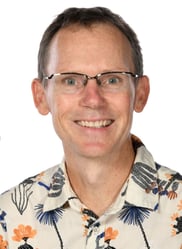 MobileMakersEdu Teacher Spotlight:
MobileMakersEdu Teacher Spotlight:
Mark Burpee, American School in Japan
Mark is a life-long educator, and he leans into an adventure. He began his teaching career as an Outward Bound®️ instructor leading mountaineering, sea kayaking, and hiking expeditions. He transitioned to the classroom in California Public Schools teaching humanities. But loving an adventure, Mark made a move to Taiwan to continue his career there. Soon after, Mark took another chance and stepped into the world of coding. Having no experience in computer science, he trained and became certified to learn and also teach coding.
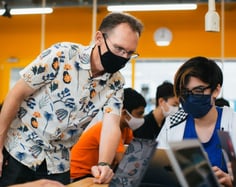 He's now in Japan teaching both humanities and coding to 8th-grade middle schoolers. This year (and past years) his students were awarded the top prize in the MobileMakersEdu Create Your Own App Contest.
He's now in Japan teaching both humanities and coding to 8th-grade middle schoolers. This year (and past years) his students were awarded the top prize in the MobileMakersEdu Create Your Own App Contest.
We caught up with Mark to learn more about the fascinating connection between humanities and coding, his experience with MobileMakersEdu, and why coding can engage students in unexpected ways.
MobileMakersEdu - Launching a Mobile App Curriculum
Mark was the agent of change at the American School in Japan. Mark shared, "Our school didn’t have a computer science elective available to middle schoolers, so I proposed that we find one. The administrative team was very supportive and encouraged me to attend the MobileMakersEdu training, which is a professional development program for teachers. In fact, one of them attended it with me."
.jpg?width=1692&name=2021.Mark.Burpee.Japan.MME.%20(2).jpg)
With MobileMakersEdu, teachers are trained to teach mobile app coding. Students learn to build mobile apps through the intuitive Swift programming language for iOS. The curriculum is grounded in tools and methods used by professional software developers, so it's no simulation - it's the real deal.
"MobileMakers curriculum and pedagogy allowed a novice like me to begin the journey of learning to teach computer science."
~ Mark Burpee, Humanities and Computer Science Teacher
Coding Engages Students from Different Angles
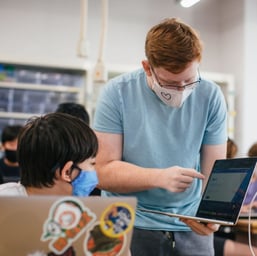 What many don't recognize is that coding isn't just about ones and zeros. The process of learning to build apps can appeal to students' various attributes and thinking styles. Mark put it this way: "I love the way app building has so many entry points. Some students really get into user interface design. Other students thrive on the logical problem solving aspects of programming. Others are great collaborators who bring out the best in their classmates to build an app together."
What many don't recognize is that coding isn't just about ones and zeros. The process of learning to build apps can appeal to students' various attributes and thinking styles. Mark put it this way: "I love the way app building has so many entry points. Some students really get into user interface design. Other students thrive on the logical problem solving aspects of programming. Others are great collaborators who bring out the best in their classmates to build an app together."
Also, there are similarities between teaching humanities and coding, Mark shared. "I find the design cycle concepts of software development transfer. For example, it's important to go through lots of low-fidelity iterative drafts with feedback loops early in the writing process, just like with developing."
A MobileMakersEdu classroom is set up much like a developer workspace or a 'dev shop' to create a real-world learning environment, and the experience is authentic, purposeful and student-driven. "The constantly collaborative environment, the creative problem solving, the cumulative acquisition and application of technical knowledge, and the production of a concrete product that can run on a simulator or on a personal device are all rewarding for me and my students."
Building Transferable Skills
.jpg?width=296&name=2021.Mark.Burpee.Japan.MME.5%20(1).jpg) Mobile App coding can be an engaging, supplemental course in a CS pathway, or an option to expose kids to the world of coding — a great entry point to CS because it's relatable (phones and ipads!) and students are empowered to create within the first week of class. Mark offered this, "For most of my students, my class is their first taste of computer science—and they dive right in—so I want them to have fun, develop confidence, and learn some fundamental software development concepts. I want them to practice collaborating, communicating and step through an iterative design cycle. In the process, they gain some autonomy at problem solving. At the end of the course, I want them to be hungry to learn more in the field of computer science." Regardless, these are transferable soft skills (life skills!) that serve young people whatever their future path might be.
Mobile App coding can be an engaging, supplemental course in a CS pathway, or an option to expose kids to the world of coding — a great entry point to CS because it's relatable (phones and ipads!) and students are empowered to create within the first week of class. Mark offered this, "For most of my students, my class is their first taste of computer science—and they dive right in—so I want them to have fun, develop confidence, and learn some fundamental software development concepts. I want them to practice collaborating, communicating and step through an iterative design cycle. In the process, they gain some autonomy at problem solving. At the end of the course, I want them to be hungry to learn more in the field of computer science." Regardless, these are transferable soft skills (life skills!) that serve young people whatever their future path might be.
Empowerment & Student-Driven Experiences
In this course, students are exposed to a range of productivity tools used by software developers. Students are encouraged (and empowered) to learn and put these tools into action to support their app creation and development.
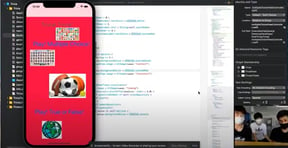 This year’s first-place contest winner developed an app idea called 'Trivial Trivia'. Mark shared, "The team of three students used GitHub to build their app collaboratively. They took on different roles in the project and worked together as a team; they even taught the rest of the class how to use Github as a workflow tool. This kind of collaborative synergy reminds me of my own experience feeling part of a teaching and software development community with MobileMakersEdu."
This year’s first-place contest winner developed an app idea called 'Trivial Trivia'. Mark shared, "The team of three students used GitHub to build their app collaboratively. They took on different roles in the project and worked together as a team; they even taught the rest of the class how to use Github as a workflow tool. This kind of collaborative synergy reminds me of my own experience feeling part of a teaching and software development community with MobileMakersEdu."
Explore Mobile App Coding for Your School
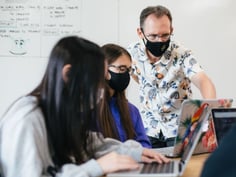 Students benefit from learning these hard and soft skills, but many districts are challenged by a shortage of teachers to teach computer science. The MobileMakersEdu programming is unique in that teachers of any discipline can learn to code and lead this course. Included is curriculum, teacher training and ongoing support and a robust learning community. Mark offers, 'I would encourage teachers of subjects other than computer science to feel confident about jumping in even without any computer science background.'
Students benefit from learning these hard and soft skills, but many districts are challenged by a shortage of teachers to teach computer science. The MobileMakersEdu programming is unique in that teachers of any discipline can learn to code and lead this course. Included is curriculum, teacher training and ongoing support and a robust learning community. Mark offers, 'I would encourage teachers of subjects other than computer science to feel confident about jumping in even without any computer science background.'
Uncharted Learning, NFP, supports student development of future-ready skills by offering youth entrepreneurship, teacher professional development and mobile app coding programs.
